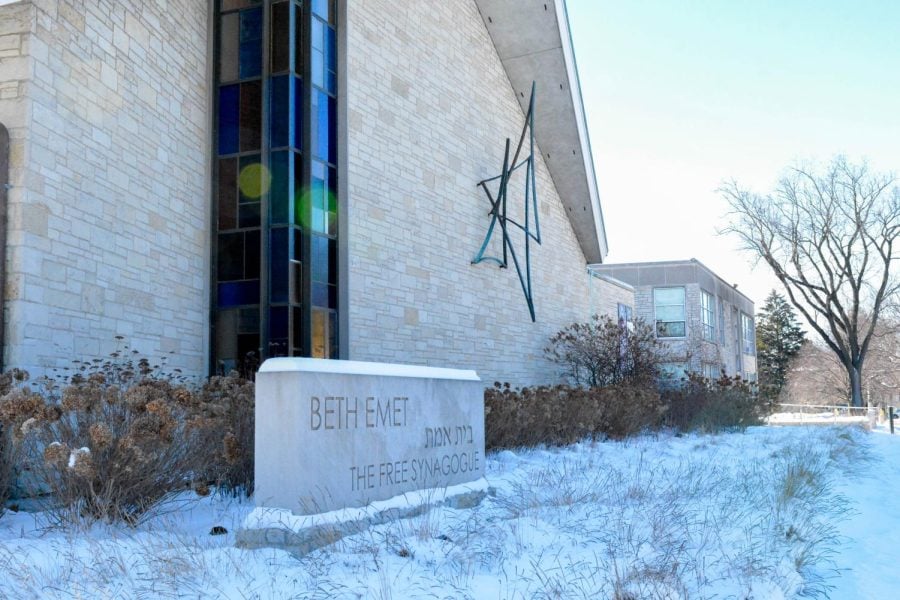Local leaders respond to recent uptick in attacks against the Jewish community
Angeli Mittal/Daily Senior Staffer
The Beth Emet Free Synagogue. After recent antisemitic attacks nationally and locally, many in Evanston’s Jewish community expressed feeling horrified and shocked.
February 9, 2022
Content warning: This story contains mentions of antisemitic attacks.
On Jan. 31, Chicago police responded to multiple antisemtitic vandalism attacks regarding an individual painting swastikas on synagogues and Jewish businesses in West Rogers Park.
These attacks came just a few days after Holocaust Day of Remembrance, and two weeks after an attacker entered Congregation Beth Israel in Colleyville, Texas and took four hostages. The hostages were released unharmed after 11 hours, and the attacker was shot by an FBI Hostage Rescue Team.
Andrea London, senior Rabbi at the Beth Emet Synagogue, is a colleague of Rabbi Charlie Cytron-Walker, who was one of the four hostages. She raised safety concerns for places of worship moving forward.
“Congregations are supposed to be places that are open, welcoming and allowing people that are in need of that spiritual support to come in,” London said. “We need to figure out how to continue to keep our places open, but also safe, which is a balance that is certainly difficult to strike.”
Evanston resident Lesley Williams said her initial thought after hearing about the attacks was “America as usual.”
Williams explained an important aspect of effectively building ties within Evanston’s Jewish community is to recognize it comprises of more than just white Ashkenazic people.
“(The Jewish community) is Miskai people, it is African American Jews, Latinx Jews, Asian Jews,” Williams said. “That often gets overlooked in these conversations, and the only way to address this is to look at the underlying question of white supremacy.”
Mayor Daniel Biss, who is Jewish, said he wants to act in tandem with other Jewish community leaders to address antisemitism. He added that the city needs to continue to acknowledge antisemitism as a pervasive evil.
Biss also said he has been in contact with several Evanston rabbis and Northwestern’s Hillel and Chabad leaders to ensure Jewish congregations are supported and incorporated in the city’s civic life.
“It’s very scary how deeply ingrained antisemitism is in the world of white supremacy and white nationalism,” Biss said. “(The recent events) are a wake-up call and demand we treat antisemitism as it is — a real live form of hatred that can be deadly when it grows unchecked.”
Echoing Biss, Rep. Jan Schakowsky (D-Evanston) released a statement reacting to the upsetting events, and said she was “horrified” to learn of the West Rogers Park incidents.
“These are not isolated events. We are seeing an alarming uptick in antisemitic violence throughout the nation,” Schakowsky said. “This is unacceptable.”
In his recent budget proposal, Gov. J.B. Pritzker allocated $20 million in security investments to prepare for hate crimes. The State of the State and Budget Address explained Illinois is awarding grants to community-driven violence prevention efforts to reduce the direct burden on police from violent crime.
Rabbi Brant Rosen of Tzedek Chicago shared his thoughts regarding institutions, such as the police, being part of the problem.
“We are living in a time of growing intolerance in general. The Muslim community had been under attack since 9/11 and there is police violence toward people of color everyday,” Rosen said. “The kinds of racism and antisemitism that are paritcularly dangerous are the kinds that are institutionalized by the government, police, or hateful organizations.”
Email: ellajeffries2025@u.northwestern.edu
Twitter: @ellajeffriess
Related Stories:
— Northwestern, Evanston police increase patrol near Jewish institutions
— Hillel symposium continues campus conversations about Zionism, anti-Semitism and racial justice



